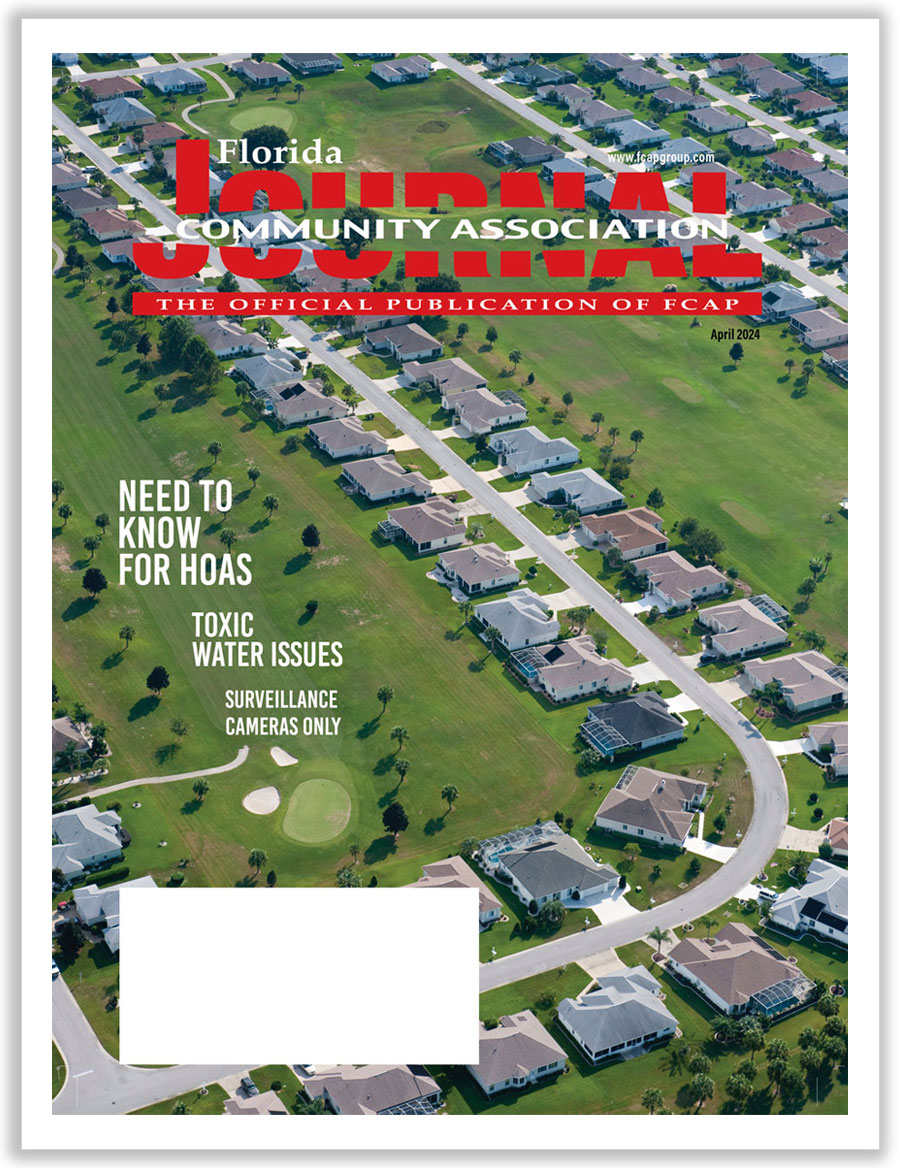
Bless Their Hearts
By Betsy Barbieux, CAM, CFCAM / Published May 2019

In every part of the state several times a month, those who want to become community association managers are attending the required two-day CAM Pre-licensing Course before they sit for the state exam. Hour after hour these applicants are presented information that is so voluminous that brain fog usually sets in by 11:00 a.m. the first day. It doesn’t take long for the applicants to realize the laws are very different for condominiums, cooperatives, and homeowners associations; yet these applicants are required to remember and separate all the facts in their heads, add to that some timeshare statutes, memorize them all, and pass a test. The applicants soon question the sensibility of the statutes and the legislators in creating such a disorganized web of laws.
If the legislators really wanted to help the industry and those who professionally manage it, they could make the laws more consistent. An example would be when a board member is recalled from the board—a condominium board member has ten days to relinquish records in his position, a cooperative board member has five days to relinquish records, and a homeowners association board member has three days. There is no reason for these timeframes to be different.
Another example would be voting on material alterations and substantial additions in a condominium association, which requires a 75 percent vote of the entire membership if their documents are silent. However, in a cooperative association the vote required is 2/3 of the entire membership if their documents are silent. There is no reason for these to be different. The only mention of material alterations in the homeowners association statute is this: “Subsequent to recording the declaration, agreements acquiring leaseholds, memberships, or other possessory or use interests not entered into within 12 months after recording the declaration may be entered into only if authorized by the declaration as a material alteration or substantial addition to the common areas or association property. If the declaration is silent, any such transaction requires the approval of 75 percent of the total voting interests of the association.”
And speaking of material alterations and substantial additions, there’s no statutory definition. Some experts will say that a material alteration is any change from the original scheme and design of the developer. Other experts will say that a substantial addition is the expansion of or addition to the common elements or common areas. When asked at a Division of Condominiums’ workshop, the Division representative was asked how the Division defined material alteration. The Division representative said the following: “If a 12-year-old can tell that it is different, then it is a material alteration.”
Another example that CAM applicants notice is terminology such as the words “common elements,” which is the phrase used in condominiums to indicate anything outside the unit airspace that is shared by all of the owners. Yet the phrase “common areas” is used to describe the exact same things in a cooperative. In a homeowners association, the legislators have chosen to use three phrases to describe anything that is not on the individual lots: “association property,”
“common property,” and “common area.” It would be easy for the legislators to be consistent when referring to the membership. But instead they’ll use any one of these words or phrases: members, owners, membership, or voting interests. By now the CAM applicants have learned to cuss Southern style—“Bless Their Hearts.”
Another head-shaking revelation is the difference the legislators have made regarding the year-end financial statements and reports. In a condominium or homeowners association, if the annual revenues are $150,000 but less than $300,000, the association prepares a compilation. If the revenues are more than $300,000 but less than $500,000, the association prepares a review. If the revenues are greater than $500,000, the association prepares an audit. Yet when amending the cooperative statute several years ago, apparently it was impossible for the legislators to copy and paste that same language. Instead they wrote that a cooperative with revenues between $150,000 and $299,999 would prepare a compilation, those with revenues between $300,000 and $499,999 would prepare a review, and those greater than $500,000 would prepare an audit. It’s hard to explain to manager applicants how this could happen because it seems that it would be so easy to copy and paste.
Several topics that are required learning for CAM applicants have to do with rescission (cooling-off) periods for sales contracts, developer guarantees, warranties, and transition requirements; none of which will be relevant to new managers and very seldom useful to seasoned managers. For instance, they learn that the rescission time for the condominium and cooperative developer’s initial sales contract is 15 days. They also need to learn that the rescission time for the condominium and cooperative owner’s subsequent sales contract is three days; the homeowners association sales contract rescission period is three days regardless of it being the initial sale or a resale. Finally, they learn the rescission period for the timeshare sales contact is 10 business days. By now, the CAM applicants are pulling out their hair. Managers don’t get involved in sales contract rescissions! Memorizing and keeping all these numbers straight for CAM applicants is overwhelming. Having to memorize information they likely will never use is very frustrating.
If the legislators really wanted to help the practical side of our industry, they could change the homeowners association laws to make the election process the same as condominiums and cooperatives. Since we are not yet in the paperless age, the two-envelope system used by condominiums and cooperatives is a very good system. Without calling the legislators brilliant, they have been clever in creating the two-track system for condominiums and cooperatives so that the election process is separate from, but simultaneous to, the annual meeting process. This two-track system allows associations to elect new leadership each year even if they cannot get a quorum to conduct any of the business of the annual meeting.
Thank you, legislators, for finally giving us some statutory standards for board members in good standing; that is, not delinquent and not a convicted felon whose civil rights have not been restored for at least five years before election and removal if charged with a felony theft of association funds. Thank you, legislators, for giving us a statutory fine process; however, it still needs some work. Thank you, legislators, for giving us the statutory special emergency powers in case of a declared state of emergency. Bless your hearts.
Scott O’Connor
TRC Worldwide Engineering Restoration
Betsy Barbieux, CAM, CFCAM, guides managers, board members, and service providers in handling daily operations of their communities while at the same time dealing with different communication styles, difficult personalities, and conflict. Effective communication and efficient management are her goals. Since 1999, Betsy has educated thousands of managers, directors, and service providers. She is your trainer for life! Betsy is the author of Boardmanship, a columnist in the Florida Community Association Journal, and a member of the Regulatory Council for Community Association Managers. For more information, contact Betsy@FloridaCAMSchools.com, (352) 326-8365, or www.FloridaCAMSchools.com.




